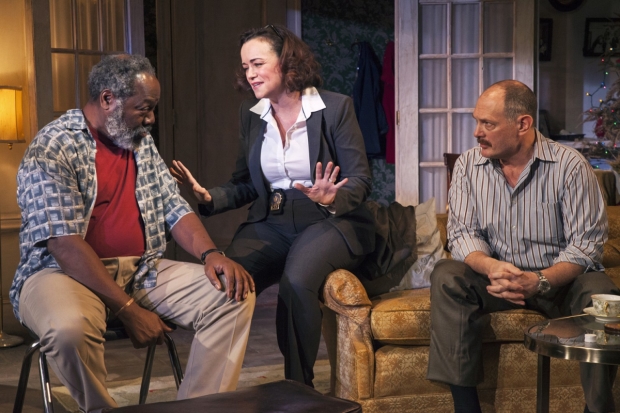Between Riverside and Crazy

(© Allie Dearie)
Between Riverside and Crazy, the vividly accurate portrayal of New York City that first appeared in 2014, is enjoying a fresh makeover at Studio Theatre. Stephen Adly Guirgis' brassy, passionate, and moving play about seven quirky New Yorkers won the 2015 Pulitzer Prize for Drama. At Studio, it is being directed cleanly and forcefully by Brian MacDevitt.
The story behind Between Riverside and Crazy seems almost prescient in terms of the violence it portrays, although it was written before the "Black Lives Matter" movement began. It reflects an event that happened in 1994, when an undercover black transit policeman was shot five times by an off-duty, white NYPD cop. In Guirgis' play, a black policeman, Walter "Pops" Washington, still reeling from the recent death of his wife, is also recovering from the fact that he was shot six times by a white cop eight years earlier and has never been adequately compensated for it by the City. He lives in one of the few remaining rent-controlled apartments on the Upper West Side, but his suit against the City threatens his continued stay there.
Walter's son, an ex-felon named Junior, lives with him, as does Junior's girlfriend, Lulu, and a recovering addict named Oswaldo. Between Riverside and Crazy also includes Walter's former partner, Detective O'Connor, and her fiancé, Lieutenant Caro. The couple have come to dine with Walter and pressure him to sign a non-disclosure statement the City is proposing. Walter orders the two visitors from his house, roaring in a drunken haze that, "Walter Washington is a flesh and blood man…." Later, Walter is visited by a Brazilian "Church Lady," whose stated goal is to get Walter to take communion with her, but whose ministrations change the course of Walter's path.
Frankie R. Faison is powerful as the volcanic, unpredictable, cantankerous Walter, who begins each day by drinking himself into oblivion, then at the first opportunity excoriating his son for some failure that only the father perceives. Walter's life is on view in every second of this play, and Faison has the kind of stage presence that keeps all eyes trained on him.
Bryant Bentley has a smooth authoritativeness as Junior. Bentley nicely demonstrates Junior's dilemma: although he loves his father, he is sick of being cast in the role of a perpetual failure, which is how Walter sees him. Sean Carvajal is excellent as the swaggering Bronx native Oswaldo, whose drug recovery is not as complete as he likes to brag it is.
Cristina Frias is hilarious as the mysterious Church Lady, who leads Walter to a new kind of self-knowledge. Emily Townley and David Bishins are well-cast as the couple who try to get Walter to accede to the City's demands. Lulu feels like the only misstep in the production. As a part which should be played with equal emphasis on sexuality and humor, Jasmin Tavarez goes only for the humor.
Lee Savage's set illustrates the condition of Walter's life. The dining room table perpetually holds a bottle of Jack Daniels; a table in the living room is littered with empty pizza boxes; the walls of the ample apartment are filthy. Above, the rooftop serves as a refuge. Dede Ayite's costumes further demonstrate Walter's situation: He holds court in his apartment in an undershirt, pajama pants, and slippers. Eric Shimelonis' sound design divides the scenes of the show with familiar rock and jazz standards.
Between Riverside and Crazy is a brilliant jumble of liars and con-artists, an exhilarating mix of Hispanic, white, and African-American voices arguing nonstop. The majority of the play gives the sense that no discussion will ever be settled, no suit ever won. But by the end, Walter has an emotional awakening, gaining a measure of revenge on all those who have cheated him in the pastand achieves a sense of control over his life. Although Guirgis deliberately leaves Walter's immediate future obscure at the end , we get the sense that he has been forever changed by the events that unfolded on Riverside Drive.











